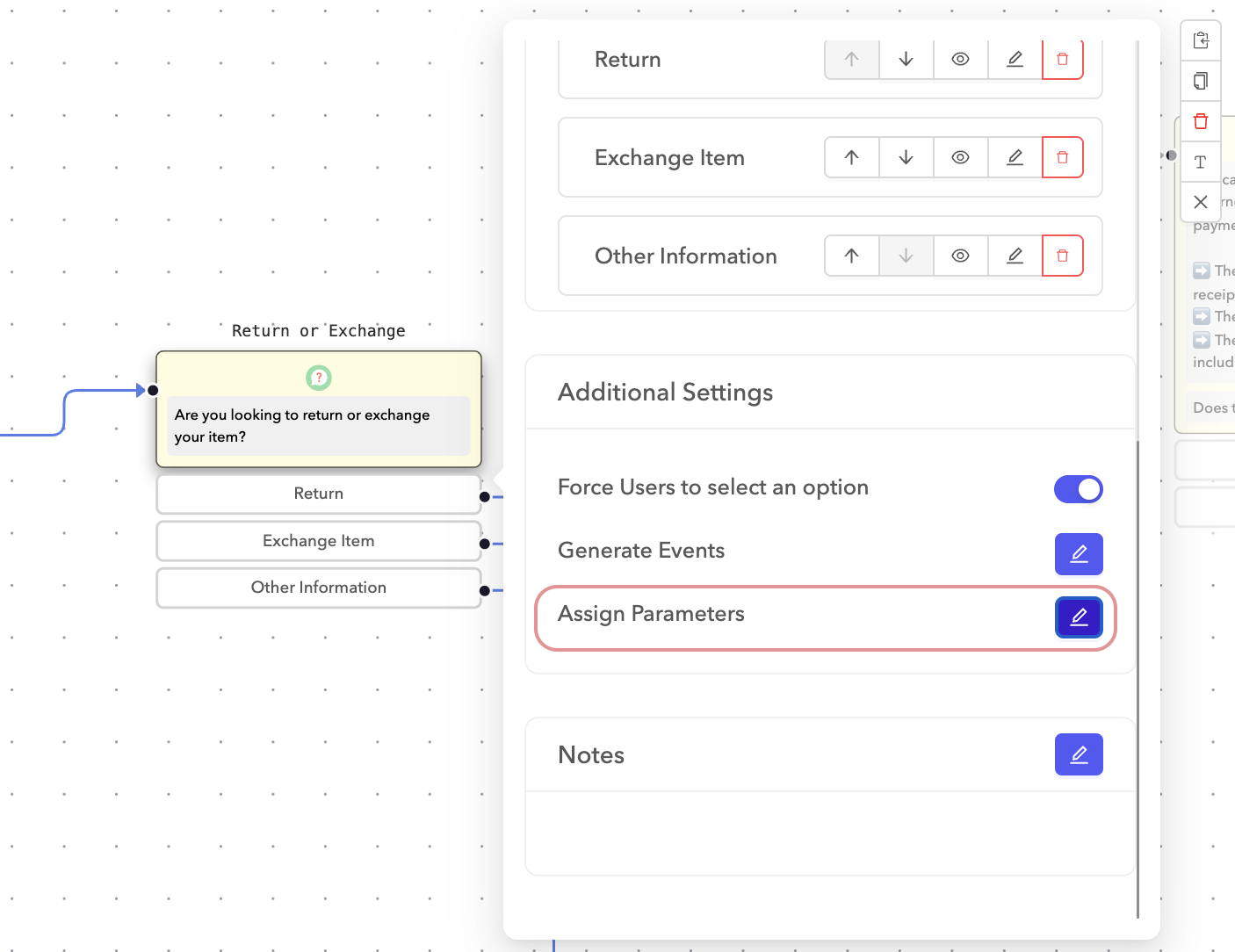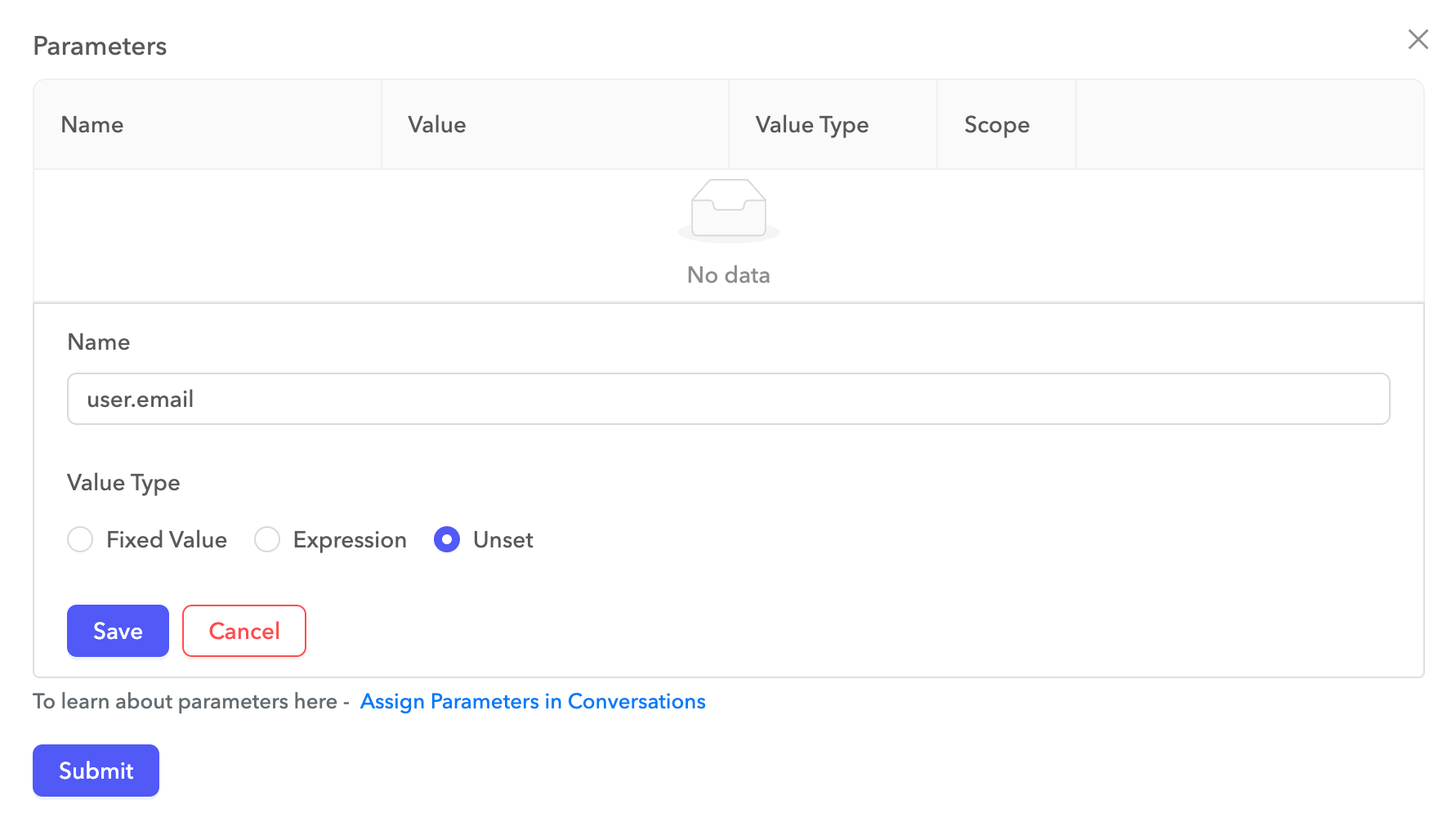# Parameters
Parameters store information collected or generated during a conversation with an AI agent. The agent uses these parameters to guide the conversation, personalize responses, and enable automated actions.
For example, if a user selects Support as their reason for contacting your organization, the agent can store that choice in a parameter and use it to guide decisions later in the flow.
# Assign a parameter to a node
You can create and assign parameters in the conversation flow builder. Parameters are typically assigned when a user reaches a specific node.
Complete the following steps to assign a parameter to a node in the conversation flow builder:
Select a node.
Locate the Additional Settings section.
Click Edit next to Assign Parameters.
 Assign parameters to a node
Assign parameters to a node
Add or update parameters.
PARAMETER ASSIGNMENT
Parameters are assigned after the node is evaluated and become available for use in subsequent steps.
# Types of parameter values
You can assign the following types of values to parameters:
# Fixed values
Fixed values allow you to set parameters using predefined values or system data.
| Parameter | Description |
|---|---|
$sys_transcript | Stores the transcript of the conversation up to this point. |
$sys_outgoing_transition | Captures the user's selection from a Question node into a parameter. |
$a.b.c | Copies a nested parameter value from the conversation context, useful for nested JSON responses. |
<Any Text Value> | Saves a custom text value in the parameter, available throughout the conversation. |
# Action parameters
Action parameters allow you to define specific actions to take during flow execution. These are fixed value parameters with a value that serves as a property for the parameter.
| Parameter | Description |
|---|---|
__action_delay | Number of seconds to delay the transition to the next node. The maximum is 15 seconds. |
# Predefined parameters
AgentX Support provides several predefined parameters to simplify flow configuration:
| Parameter | Description |
|---|---|
__sys_userIp | The IP address of the user. |
__sys_userAgent | The user agent string of the browser. |
__sys_userAgentParsed | Parsed representation of the user agent. |
__sys_userCountry | The user's country as identified by Cloudflare. |
__sys_conversationId | The unique conversation ID. |
__sys_userAction | The last action taken by the user. |
__sys_channel | The communication channel used for the conversation. |
__sys_activeIntent | The currently active intent in the conversation. |
browser_path | The URL path the AI agent was loaded on. |
browser_hostname | The hostname of the browser. |
browser_referrer | The referring URL of the webpage. |
browser_isMobile | Indicates if the user is on a mobile device. |
# Expressions
Expressions allow you to transform data and store the result in a parameter. This can be useful for operations such as math, string manipulation, or using built-in platform functions.
# Operators
The following operators can be used with conversation parameters:
| Operator | Description |
|---|---|
+ | Addition (x + y) or string concatenation (firstName + ' ' + lastName) |
- | Subtraction (x - y) |
/ | Division (x / y) |
* | Multiplication (x * y) |
** | Exponentiation (x ** y) |
% | Modulus (remainder) (x % y) |
== | Equals comparison (x == y) |
< | Less than comparison (x < y) |
> | Greater than comparison (x > y) |
<= | Less than or equal to (x <= y) |
>= | Greater than or equal to (x >= y) |
in | Check if something is contained within another ("spam" in "my breakfast") |
# Utility functions
Utility functions are available to perform various operations on parameters:
| Function | Description |
|---|---|
DOUBLE | Converts a parameter to a floating point type. |
MD5 | Generates the MD5 hash of the parameter. |
INT | Converts a parameter to an integer type. |
STR | Converts a parameter to a string type. |
SORT_LIST | Sorts a list of values in ascending order. |
REVERSE_LIST | Reverses the order of a list of values. |
APPEND_LIST | Appends a value to a list. |
SUBSTITUTE | Substitutes part of a string. For example, SUBSTITUTE(param1, '-', '_'). |
FORMAT_DATE | Formats a date. For example, FORMAT_DATE(param1, <date_format>). For date formats, refer to strftime (opens new window). |
REGEX_EXTRACT | Extracts a substring using regular expressions. For example, REGEX_EXTRACT(param1, <pattern>). |
SPLIT_PART | Splits a string into parts. For example, SPLIT_PART('Alex Workato', ' ', 1) extracts "Workato". |
CURRENT_DATE_BETWEEN | Checks if the current date is between two given dates or timestamps. |
# Unset parameters
Unset parameters are placeholders that don't have a fixed or predefined value. This parameter type is set dynamically based on the user's context during the conversation.
 Unset parameters
Unset parameters
# Use parameters in messages
You can reference parameters in messages using templating. For example, if the AI agent collects the user's first name and stores it in a parameter called firstName, you can use a question node to display the following message:
Hi, {{ firstName }}. How can I help you today?
Last updated: 6/23/2025, 2:33:20 PM